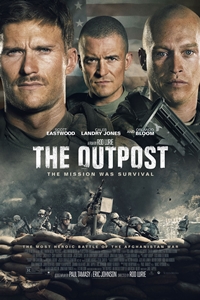The Outpost (R) ★★★
 The Outpost recounts events surrounding the Battle of Kamdesh, an action that occurred in October 2009 when a force of approximately 300-400 Taliban attacked the U.S. Combat Outpost Keating, which was located in a valley of the Hindu Kush mountain range of Afghanistan, 14 miles away from the Pakistani border. Directed by Rod Lurie (The Contender) from a book written by Jake Tapper, the movie functions as well as an ensemble war movie can. On a technical level, it's top-notch - fully immersive and impactful, effectively conveying the violence, sudden death, and chaos of the battle. The drawback, however, is that with so many characters vying for screen time, no one commands the viewer's attention and The Outpost ends up being populated by soldiers who are mostly anonymous and/or interchangeable.
The Outpost recounts events surrounding the Battle of Kamdesh, an action that occurred in October 2009 when a force of approximately 300-400 Taliban attacked the U.S. Combat Outpost Keating, which was located in a valley of the Hindu Kush mountain range of Afghanistan, 14 miles away from the Pakistani border. Directed by Rod Lurie (The Contender) from a book written by Jake Tapper, the movie functions as well as an ensemble war movie can. On a technical level, it's top-notch - fully immersive and impactful, effectively conveying the violence, sudden death, and chaos of the battle. The drawback, however, is that with so many characters vying for screen time, no one commands the viewer's attention and The Outpost ends up being populated by soldiers who are mostly anonymous and/or interchangeable.
Having recently re-watched Band of Brothers, I was struck by some of the similarities between the landmark 2001 HBO mini-series and The Outpost. Both have comparable challenges in terms of character identification (which Band of Brothers was able to at least partially overcome due to its 10+ hour running time) and, although war technology has changed substantially between 1944 and 2009, the sense of being in combat, with the immediacy of violence and death, has not. Lurie's approach isn't as graphic as some depictions of war but neither does he sanitize events. Yet, although viewers may be rattled by the explosions and firepower, there's little emotional connection to any of the characters. (Contrast this to 1917, where Sam Mendes elected to focus on two principals.) The only individual I felt I half-knew is dead before The Outpost's midpoint.
Although the central event in The Outpost - and the one that occupies roughly the entire second half - is the Battle of Kamdesh, the movie provides background that illuminates the precarious military and strategic background as far back as 2006. (The timeframe, however, appears to have been compressed.) There are several scenes featuring Lt. Benjamin D. Keating (Orlando Bloom), who died in November 2006; the camp was re-named in his honor in December of that year. The tenure of his successor, Captain Robert Yllescas (Milo Gibson), also predated the battle. To the extent that there are major characters, those would be Staff Sergeant Clint Romesha (Scott Eastwood) and Specialist Ty Michael Carter (Caleb Landry Jones), both of whom were awarded Congressional Medals of Honor. No one else leaves a strong impression due to a lack of screen time, background story, and/or actor recognition.
In a letter accompanying the critics' screening link, director Lurie lamented that, due to circumstances, the film would not be viewed as intended - on a big screen with a full-throated audio system. Indeed, the movie contains its share of "spectacle" moments but, like Band of Brothers, the impact translates effectively to home viewing. The Outpost packs a more forceful punch than a generic war movie, due in large part to the efforts of those involved to replicate the location and experience.
One curious point of trivia is that three of Lurie's actors are the direct descendants of well-known actor/directors: Scott Eastwood (son of Clint), Milo Gibson (son of Mel), and Will Attenborough (grandson of Richard). Of the three, Eastwood has the most commanding screen presence (and is also the most seasoned of the bunch). The first-billed performer, Orlando Bloom (who is largely unrecognizable with his buzzcut), is in only a handful of scenes, all of which occur during the film's first half-hour.
The overall experience of watching The Outpost isn't akin to that of a Platoon or an Apocalypse Now. It's not just that its goals are different but the sense of character investment isn't present. But, unlike movies with a political agenda, this one focuses predominantly on the heroism of the participants rather than the rightness or wrongness of the war in which the battle transpires. For those who appreciate the genre, this is a better-than-average merging of technical craftsmanship, narrative coherence, and competent acting.
© 2020 James Berardinelli
To get the full Quicklook Films experience, uncheck "Enable on this Site" from Adblock Plus
box office top 10

Civil War Released: April 12, 2024 Cast: Kirsten Dunst, Wagner Moura 11.1M

Abigail Released: April 19, 2024 Cast: Melissa Barrera, Dan Stevens 10.2M

Godzilla x Kong: The New Empire Released: March 29, 2024 Cast: Rebecca Hall, Brian Tyree Henry 9.5M

The Ministry of Ungentlemanly Warfare Released: April 19, 2024 Cast: Henry Cavill, Eiza Gonzalez 9M

Spy x Family Code: White Released: April 19, 2024 Cast: Takuya Eguchi, Saori Hayami 4.9M

Kung Fu Panda 4 Released: March 8, 2024 Cast: Jack Black, Viola Davis 4.6M

Ghostbusters: Frozen Empire Released: March 22, 2024 Cast: Paul Rudd, Carrie Coon 4.4M

Dune: Part Two Released: March 1, 2024 Cast: Timothée Chalamet, Rebecca Ferguson 2.9M

Monkey Man Released: April 5, 2024 Cast: Dev Patel, Sikandar Kher 2.2M

The First Omen Released: April 5, 2024 Cast: Nell Tiger Free, Bill Nighy 1.7M






